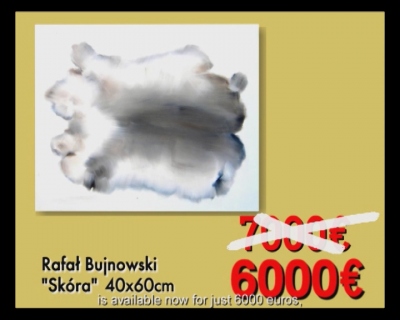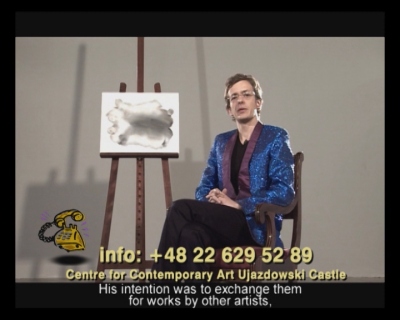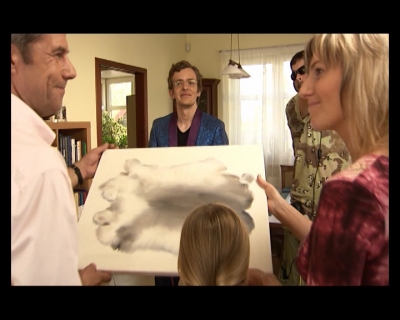Oskar Dawicki
Skórka za wyprawkę
In Skórka za wyprawkę, Dawicki critiques the art market. He does it in his own way, with humour and irony. The film follows the teleshopping convention. The subject of the sale is a 2003 painting by Rafał Bujnowski, Skórka. Dawicki, in an outfit typical of his previous performances, a navy blue brocade jacket, persuades the audience to buy the painting using typical marketing techniques. The film uses elements characteristic of advertisements. A nice family has trouble with a rabbit skin, gathering dust on a wall in their house. Dawicki finds a solution in the form of a painting depicting such an item. The price of the painting/commodity is extremely attractive – 7000€! What’s more, as part of an extremely favourable special offer, you can also buy an advertising video – both for 8500€. The persuasive message is reinforced by art market experts’ opinions from unquestionable authorities in this field – Anda Rottenberg, Jarosław Suchan, and Adam Szymczyk.
When discussing works of art, we rarely discuss their market value. And yet, just like in other areas of life, money plays a huge role in art. Artists’ livelihoods and the range of possibilities they have in their work depend on them. Art undoubtedly needs the art market, but the forms of promotion it enforces can easily become grotesque – they are funny and simultaneously a little frightening, which Dawicki presents in this piece with a great deal of grace and mockery.
Oskar Dawicki is a performer, he creates objects and videos. He studied painting at the Faculty of Fine Arts of the Nicolaus Copernicus University in Toruń. In 2001–2010 he was a member of the Azorro artistic group. The curators Łukasz Gorczyca and Łukasz Ronduda who collaborated with Dawicki were inspired to write a book about his art. He made the feature film Performer himself, in which he played himself.
Dawicki is interested in issues related to his artistic identity and how the art world operates, market principles, and the institutional nature of culture. He is often associated with performance, but often tries to change the principles of this field.


